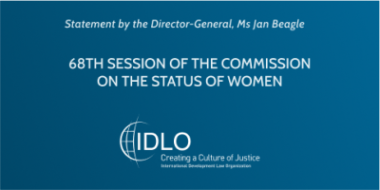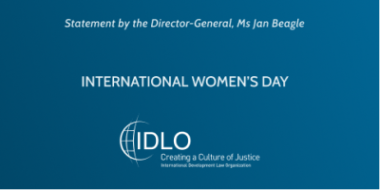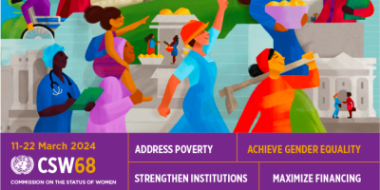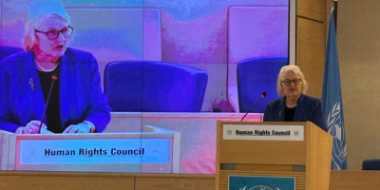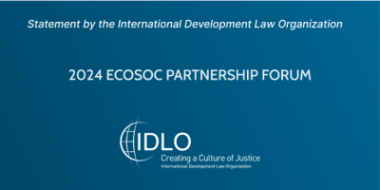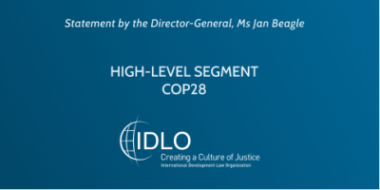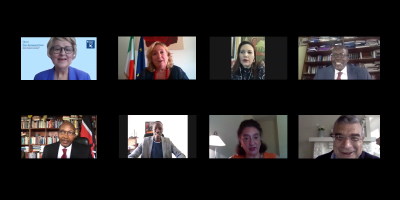

On July 1, the International Development Law Organization (IDLO) hosted a multi-stakeholder dialogue on policy responses to the COVID-19 pandemic, focusing on the links between crisis governance and the rule of law. The event marks the launch of IDLO’s Crisis Governance Forum—a series of online dialogues intended to offer a platform for policy-makers and other stakeholders to share insights and lessons learned in responding to the pandemic and in framing sustainable recovery strategies that engage citizens’ participation and trust, and build resilience for the future.
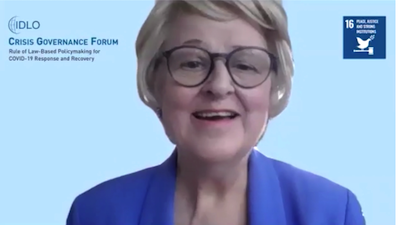 |
Jan Beagle
IDLO Director-General |
“The pandemic has exposed and is in turn being aggravated by the fragility and inequalities to which no country, irrespective of stage of development, is wholly immune. It has revealed in the clearest possible terms that, unless we act to tackle the inequality, insecurity and injustice that are at the core of this fragility, our societies will continue to be vulnerable to shocks and crises and our common future will continue to be insecure”, said IDLO Director-General Jan Beagle, opening the discussion. “We see striking illustrations the world over of the resilience of people, of their capacity to sacrifice and of their readiness to do their part for the common good. They are entitled to expect that governments likewise rise to the challenge, and the challenge is fundamentally one of leadership. The rule of law is critical to successfully managing the crisis: by protecting the least powerful and giving them a voice in the debate, by enabling the decision makers to balance competing interests, and by increasing their ability to act decisively through effective laws and institutions”, Beagle said.
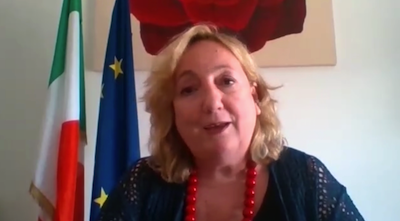 |
H.E. Emanuela Del Re
Vice-Minister of Foreign Affairs and International Cooperation, Italy |
Emanuela Del Re, Vice-Minister of Foreign Affairs and International Cooperation of Italy shared her country’s experience in responding to the pandemic and mentioned the imperative of a concerted global response. “Italy was the first European country to deal with the COVID-19 crisis. At the outset of the health crisis, the Italian government put in place safeguards to ensure that anti-Covid-19 measures complied with core constitutional principles and international law obligations. We have established a national platform composed of public and private actors so that we can build a coherent, unitary response. Our experience is now at the disposal of [all] countries”, Del Re said, emphasizing that “only a multilateral approach will allow us to defeat the virus and overcome this global crisis. COVID-19 is presenting critical challenges for policy makers but also gives us the opportunity to learn from this emergency and improve local, national, international, and global governance. The recovery phase will also represent an opportunity for all levels of government to ‘build back better’ toward more inclusive, equal, resilient, and sustainable societies, and more effective institutions”, Del Re told the Forum.
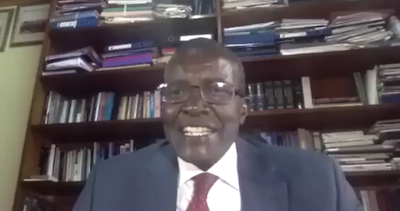 |
H.E. David Maraga
Chief Justice, Kenya |
Kenya’s Chief Justice, David Maraga and Justice Kathurima M’Inoti spoke of the many challenges facing Kenya’s judiciary during the pandemic lockdown. In crisis situations such as this one “there is no manual to refer to”, Chief Justice Maraga said, but he pointed out that “we in the judiciary knew that we had to find new ways to deliver justice and protect Kenyans from people who take advantage of the situation, abuse the rights of others [and] attempt to take others’ property”. A challenge, he explained, was keeping the judicial staff as well as the public safe from infection, “so we introduced virtual proceedings. We also acted to suspend the execution of evictions, intervened in cases of domestic assault and sought to address the spread of the infection in prisons”, Chief Justice Maraga said.
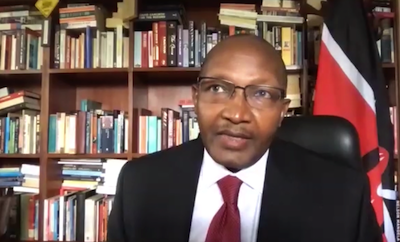 |
Justice Kathurima M'Inoti
Director, Judicial Training Institute, Kenya |
“The future lies in leveraging technology”, Justice Kathurima M’Inoti of Kenya emphasized, adding that “longstanding efforts to introduce innovation in justice delivery have now, in this crisis, become compelling, compulsory”. Justice M’Inoti also expressed his strong appreciation for IDLO’s support in this regard.
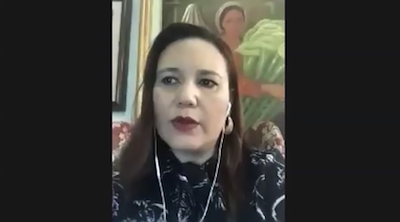 |
H.E. Rosa Seaman Sheran
Vice-Minister of the Secretariat for Human Rights, Honduras |
“There are three challenges we all face today: institutional development, political will and national budgets”, said Rosa Seaman Sheran, Vice-Minister of the Secretariat for Human Rights of Honduras. “In advancing human rights, prioritizing and targeting social protection measures is of the essence. Relying on aggregated data for over one million households, the Ministry of Human Rights of Honduras is working in collaboration with the Ministry of Development and Social Inclusion and civil society organizations. And it is supporting the executive [branch] in prioritizing social services for historically marginalized, vulnerable populations”, she explained. She said the current efforts are “focusing on the elderly and people with disabilities, given the toll that the pandemic has exacted from these groups, but increasingly extending support for people living with HIV, women facing domestic violence, and addressing issues affecting the LGBTQ community.” “It is crucial for all of us to look to the future” the Vice-Minister concluded, calling for both empathy and foresight in assessing the resources that will be required “to ensure that no one is left behind”.
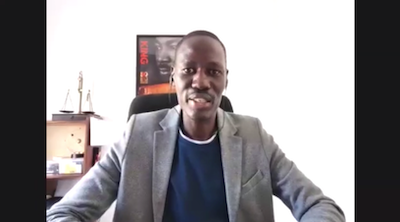 |
Gerald Abila
founder Barefoot Law, Uganda |
Leveraging technology and innovation was at the center of the intervention of Gerald Abila, founder of the nonprofit Barefoot Law in Uganda which empowers people with free legal information through use of digital technology, enabling them to develop legal solutions for their justice needs. “World-wide, communities are increasingly living in a world without safety, equality, fairness and justice—a world in which access to law and justice is inadequate, and people and communities have privileges and rights denied to them”, Abila said. “We can leverage technology and innovation to provide rule of law-based policy making for COVID-19 recovery and response” he stressed. “What started as a health crisis is fast transitioning into an economic crisis. If not properly handled it will transition into a rule of law crisis. We can make access to justice a reality for all, starting by making the law readily available. [Through] digital technology and innovation, universal access to justice can be unlocked for all”, Abila said. “Today an estimated 70% of the world’s population has mobile phones that can be drawn upon to provide legal services. We have a wealth of data on which policy making can draw, but the process needs to involve all stakeholders”, he emphasized. “We need to be prepared to learn, unlearn and relearn across all sectors of legal practice, with innovation and technology becoming core elements of legal education. We need to create public/private partnerships towards making access to justice a reality for all. The systems we design should be inclusive, no one should be left behind. We must have a human rights-based approach at the center of all of our systems’ designs”, Gerald Abila told the Forum.

Following the interventions by the distinguished panelists, members of the audience connected remotely from Canada, Kyrgyzstan, Mali, Nepal, Rwanda and Sweden among others, had the opportunity to intervene and ask questions. Topics covered in this interactive Q&A session included the importance of engaging state as well as non-state actors in the criminal justice system; ensuring access by indigenous communities to policy development for COVID-19 response and recovery; enhancing international solidarity in addressing the common challenges posed by the pandemic; protecting rule of law and human rights and safeguarding the human rights of groups such as the LGBTQ community and sex workers that have, in some cases, been “criminalized” during the pandemic. The need for flexibility and foresight in national budgeting to support IT development and technological innovations to enhance access to justice for all, was also among the topics highlighted.
Concluding remarks were offered on behalf of two key IDLO institutional partners, the United Nations Department of Economic and Social Affairs (UNDESA) and UNDP.
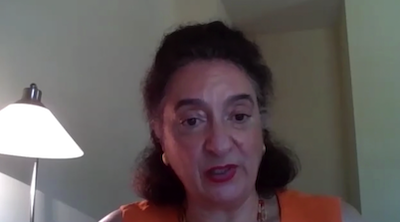 |
Maria-Francesca Spatolisano
Assistant Secretary General for Policy Coordination and Inter-Agency Affairs, UNDESA |
Maria-Francesca Spatolisano, Assistant Secretary General for Policy Coordination and Inter-Agency Affairs in UNDESA called for a rule-based approach to underpin all new economic stimulus packages that are introduced, so as to ensure equitable access to basic services and support measures to address the needs of vulnerable groups. “This crisis should not be taken as an opportunity to reverse the rights for which people fought in the past. On the contrary, policymaking should continue to be based on our shared values and principles”, she stressed. “Achieving effective rule of law-based policymaking requires effective governance capacity and leadership, committed to the principles and values of the 2030 Agenda. It requires strengthening transparency, accountability and inclusiveness in government institutions in line with Goal 16 of the 2030 Agenda for Sustainable Development”, Spatolisano reiterated. She pointed to the special relevance in present circumstances of SDG 16’s call for providing legal identity for all, including birth registration, which is a key pre-requisite to enable access to healthcare and other public services.
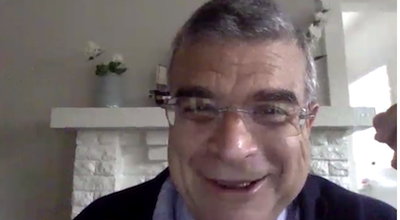 |
Mourad Wahba
Associate Administrator a.i., UNDP |
Mourad Wahba, Associate Administrator a.i. of UNDP, highlighted concerns for the erosion of the “social contract” which are evident in the uneven availability of social protection measures, but also in what appears to be a growing lack of confidence by citizens in governance and government policies. “This growing mistrust”, he said, “is not only apparent in public demonstrations and other forms of protest. It is also manifested in people turning to the so-called dark web with its conspiracy theories.” “’Renegotiating’ the social contract”, he said, “is essential to restore effectiveness in governance and combat the ‘epidemic of misinformation’” that the UN Secretary-General has denounced.
Video


